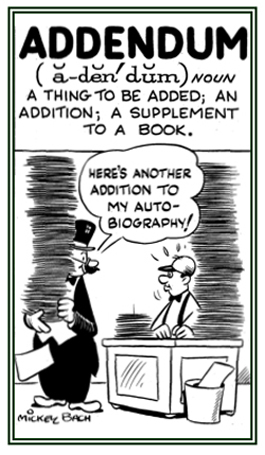ad-
(From Latin: "to, toward, a direction toward, an addition to, near, at"; and changes to: "ac-, af-, ag-, al-, an-, ap-, aq-, ar-, as-, at-" and ad- is also combined with certain words that begin with the letters c, f, g, l, n, p, q, r, s, and t.)
The Latin element ad carries the idea of "in the direction of" and combines with many Latin words and roots to make common English words.
Literally, "to a fingernail": Ad unguem is used to convey the thought of accomplishing something well or precisely.
In ancient times, a sculptor would test the smoothness of a finished surface by running a fingernail over it.
Literally, "all to one"; "unanimously": During the staff meeting at school all the teachers voted ad unum to have following day off!
Dr. Smith told Agatha that the medicine was only for ad unum externum and never to swallow it!
When Bill read the directions on the package, it mentioned to apply it ad unum for the plants and nothing else.
A mature person is ready to cope with any eventuality, including the final one; "Prepared for the worst."
Ad utrumque paratus is used as a motto on the seal of Lund University, for the Spanish Navy Submarine force, and is also located at the entrance of the Submarine School in Cartagena's Naval Station in Spain.
Compare with semper paratus.
Many states and federal governments tax energy extraction in this manner.
Ad valorem also refers to taxes as "In proportion to invoiced value of goods." A term used when imposing customs and stamp duty, the duty increasing according to the value of the transaction of goods involved.
This is the Latin equivalent of "verbatim". There are several other Latin expressions for "word-for-word", including "e verbo", "de verbo", and "pro verbo". These probably referred to the problems of making accurate copies before printing was invented.
Motto of Henry I (918-936) who forced the dukes of Bavaria and Swabia to recognize his authority. He protected Saxony against the Slavs by building several fortresses and by creating a powerful cavalry which he used to defeat the invading Magyars on the Unstrut River in 933.
King Henry succeeded in annexing the key Carolingian realm of Lorraine to the east Franconian realm. He is regarded as the actual founder of the German Empire.
Motto of Castle Jr. College, Windham, New Hampshire, USA.
A legal term found in some wills, meaning, "for use only during a person's life."
2. A saying that sets forth a general truth and which has gained credit through long use: Benjamin Franklin, an historical figure in United States History, often used a simple adage to illustrate his talks; for example, "Early to bed, early to rise, makes a man (person) healthy, wealthy, and wise."
3. Etymology: formed Latin adagium, "proverb, saying" from ad, "to" + agi, "to say, to speak".

Go to this Word A Day Revisited Index
so you can see more of Mickey Bach's cartoons.
2. To fit for a new use; to transform, to rework, to convert, to make suitable, to modify, to alter: The drama that James was watching had been adapted from a short story.
3. To undergo modifications in order to fit new circumstances or situations: The auto mechanic was adapting Ed's car for winter driving.
4. Etymology: from Latin adaptare, "to adjust" from ad-, "to" plus aptare, "to join" from aptus, "fitted".
Am abaxial plant part is on the side of a plant and faces toward the the axis.
Used in medicine meaning to "add": Adde is used by doctors as a direction when writing a prescription for a patient.
After a recent investigation, the editor added several addenda to the soon-to-be published article about plagiarism in the field of journalistic ethics.



